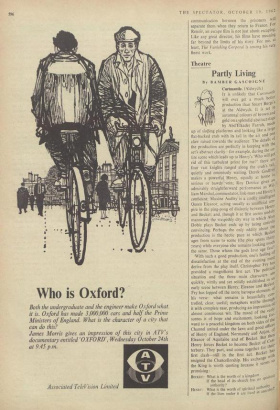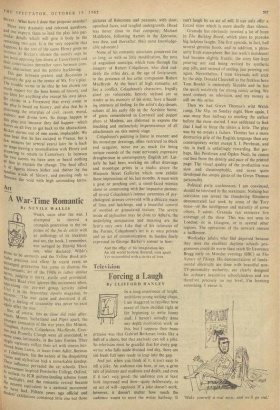Theatre
Partly Living
IT is unlikely that Cur/it/wide will ever get a much better production than Stuart Burge's at the Aldwych. It is set in autumnal colours of brown and gold on a splendid abstract stage by Abd'Elkader Farrah, made up of sloping platforms and looking like a large flat-backed crab with its tail in the air and one claw raised towards the audience. The details of the production are perfectly in keeping with the set's abstract clarity—for example, during the en- tire scene which leads up to Henry's 'Who will get rid of this turbulent priest for me?' there are four vast knights ranged along the crab's tail, quietly and ominously waiting. Derek Godfrey makes a powerful Henry, equally at home in serious or bawdy vein; Roy Dotrice gives an admirably straightforward performance as Wit" ham Marshal, commentator,link-man and Henrys confidant; Maxine Audley is a coolly intelligent Queen Eleanor, acting usually as unofficial um" pire in the ping-pong of dialectic between'HentY and Becket; and, though it at first seems unduly mannered; the waspishly dry way in which Alan Dobie plays Becket ends up by being entirely convincing. Perhaps the only oddity about the production is the hectic pace at which Becket ages from scene to scene (the play spans thirty years) while everyone else remains looking much the same. Those whom the gods love age fast; With such a good production, one's feeling of dissatisfaction at the end of the evening must derive from the play itself. Christopher FrY has, provided a magnificent first act. The political situation and the three main characters are quickly, wittily and yet solidly established in an early scene between Henry, Eleanor and Becket; Fry has lopped off the more baroque elements of his verse : what remains is beautifully c°11: trolled, clear, useful; metaphors writhe throng', it with complete ease, producing an impression of almost continuous wit. The mood of the early scenes is of hope and excitement, looking Or' ward to a peaceful kingdom on both sides of the Channel united under the laws and good offices of Henry of England, Normandy and Anil)°, of Eleanor of Aquitaine and of Becket. But the" Henry forces Becket to become Becket of Can.;• terbury. They part, and come together for their first clash—still in the first act. Becket htaisi :so the King is worth quoting because it seems promising the Chancellorship. His exchange promising: BECKET: What is the worth of a kingdom.,at If atuhtehohreiatyd?of its church has no spirit HENRY: What is the worth of spiritual authority . I
If the lives under it are lived in anarchY1
REcl'ET: What have I done that proposes anarchy? Three very dramatic and relevant questions, and one expects them to lead the play into par- ticular details which will give it body in the remaining two acts. It is the very opposite that happens. In the rest of the scene Henry gives no Instance
has been of Becket's offence (he merely says he their opposing him down at Canterbury) and , conversation thereafter veers between corn- Mete abstraction and the pettiest backbiting.
This gap between pretext and discussion is precisely the gap at the centre of Mr. Fry's play The trouble seems to be that he has shown too much respect for the bare bones of history, and ideas. He little for anything else except his own deas. He claims in a Foreword that every event in the Play is based on history, and also that he is discussing the interplay of civil, canon, moral, esthetic and divine laws. So things happen in this play just because they did happen---which leaves us all free to get back to the abstractions. Becket storms out of one scene, implacable. We then hear that he has escaped to France, but a fn ew minutes (or several years) later he is back on stage having a reconciliation with Henry and the to return to Canterbury. In between h of e two scenes we have seen or heard nothing rhim to explain the change. The final effect of figures blown hither and thither by the winds of history, and pausing only to thancloill















































 Previous page
Previous page